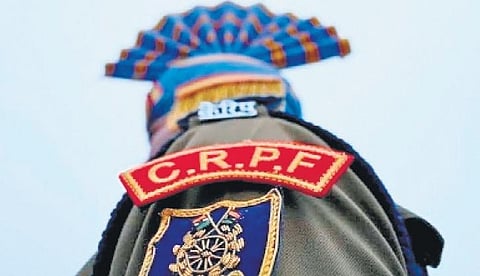

Suicides are rising in the ranks of the Central Reserve Police Force (CRPF), the most versatile paramilitary force in the country. It has once again brought to focus the need to review the selection process, training and pattern of deployment of the force.
The fact that ten deaths by suicide occurred in less than a month recently is alarming and calls for urgent action and involvement of higher levels of leadership. The service conditions, facilities and ethos of all armed forces, including the paramilitary forces, are more or less the same. Then why are cases of suicide more prevalent in the CRPF?
There cannot be any disagreement on the conclusion that the main reason for such incidents is disturbed family life. The service conditions, nature and area of deployment don’t allow a family life. While regular armed forces and other paramilitary forces are able to manage family life better by rationalising and rotating deployments, the CRPF has very limited scope for such rotations. It can only move from one theatre of conflict to another, as it is tasked with counter-insurgency, anti-terrorism and anti-Naxal operations.
The CRPF generally cannot think of family life, let alone planning the education and settlement of their children. Personnel do get posted to group centres, which are located mostly in state capitals, and training centres where family accommodation and other facilities are available. These centres can accommodate around 15 per cent of the total force strength. The postings to these centres are strictly done according to well-established norms and merit, so there is no grouse on that score. The ever-changing dynamics of internal security issues keep the rest of the troops on their toes, and CRP becomes ‘Chalte Raho Pyare (Keep on moving, dear)’.
The leadership of the force has been seized of the matter, and maximum efforts are made to minimise the frequency of dislocations. But family life is a distant dream for the bulk of the force. Even when they are posted to one of the few established centres after twelve to fifteen years of waiting, they may not bring the family along due to their children likely having to adapt to a different environment, medium of education and syllabus.
Now, this situation is nothing new to a fauji, one may say. But things have changed drastically in our society. The disintegration of joint families means there is no support system in place back home anymore. News of children falling sick, their poor performance in school, and conflicts within the family are promptly passed on to soldiers using faster communication systems.
Already on stressful assignments in hostile and risky surroundings, not all of them are tough enough to handle these together for a long time and feel helpless and frustrated, becoming vulnerable to the tendency of self-harm. The expectations of new-generation spouses are also high because of their higher educational qualifications and comfortable upbringings. The capacity to struggle is obviously depleting.
Involvement in sports and games, and cultural and regimental activities are missing on account of frequent movement, and depressive disorders set in for some. Training is yet another casualty of extensive deployment and frequent movement. The Central Reserve Police Force is anything but ‘reserve’ anymore, with such heavy and constant engagement in counter-insurgency, anti-terrorism and anti-naxal operations.
The ruggedness and ability-to-struggle nature of soldiers of the past, who were mostly from remote villages, are missing in the new generation of soldiers. So, a perfunctory Sainik Sammelan (a gathering of soldiers) is not enough to hear and redress the grievances of soldiers. The commanders need to spend more time with them informally, hold more interactive sessions and inculcate in themselves the habit of leading from the front. This will help them understand the soldiers better. Welfare and training should go hand in hand. The soldiers need to always feel assured that they are not alone—not only by the force but also by society at large.
So what are the ways out? Psychological tests at the time of recruitment and periodically thereafter, re-emphasis on regimental activities, recreation, sports and games. The introduction of a buddy system, where a friend within the force is assigned to each personnel, would go a long way too. The inclusion of yoga and meditation in the routine would also help, apart from encouraging spiritual pursuits in the Sarva Dharma Prarthana Sthal, the common prayer place of the unit.
There is nothing new in these suggestions, and real commanders of the force must be implementing them. It has been observed that incidents of suicide do not occur under the command of officers who follow these fine principles. Where these incidents do occur, it points to command failure.
And finally, why should a soldier entering the CRPF be tasked only with the arduous duties of counter-insurgency, anti-terrorist and anti-Naxal operations till the end of service? Will he be mentally and physically fit for it? Why not think of placing all young soldiers recruited to the central paramilitary forces for internal security and border duties, under the CRPF and the Border Security Force? After a sufficient exposure of ten to fifteen years, they can be drafted on static duties like airport duty and other sensitive duties under the Central Industrial Security Force. For better coordination, the government must think of creating a unified command for central paramilitary forces similar to the Chief of Defence Staff.
(Assistance for those having suicidal thoughts is available on TN’s health helpline 104 and Sneha’s suicide prevention helpline 044-24640050)
K V Madhusudhanan
Former Inspector General,Central Reserve Police Force
(madhukappuva@yahoo.co.in)